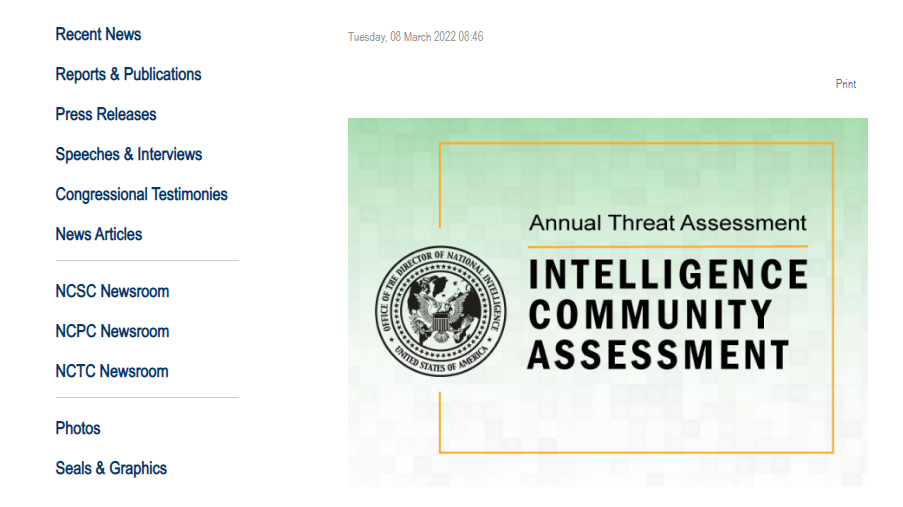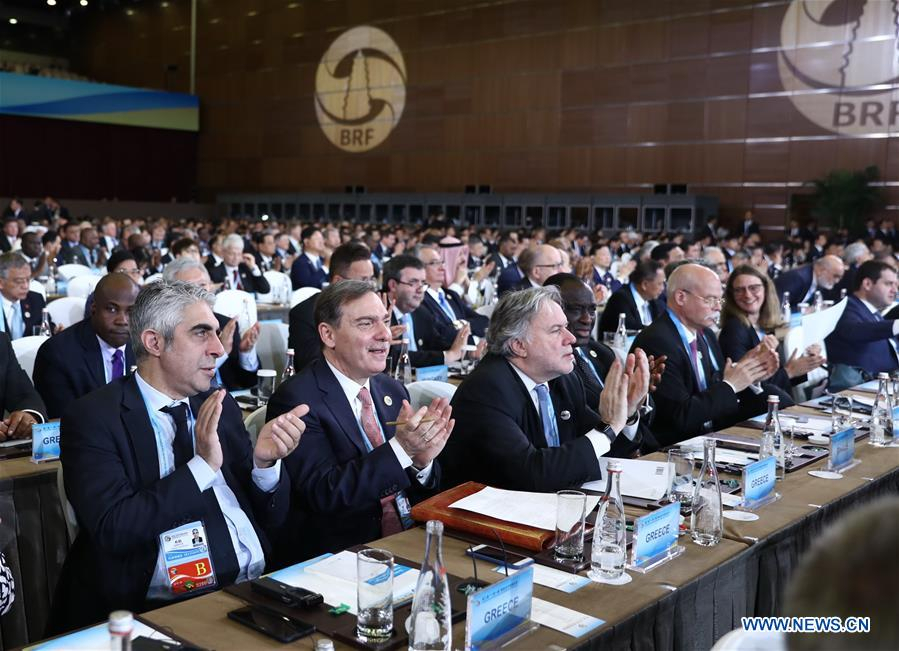
A screenshot of the "2022 Annual Threat Assessment of the U.S. Intelligence Community"
A screenshot of the "2022 Annual Threat Assessment of the U.S. Intelligence Community"
Editor's note: Andrew Korybko is a Moscow-based American political analyst. The article reflects the author's opinions and not necessarily those of CGTN.
The U.S.' Office of the Director of National Intelligence (ODNI) released its annual threat assessment study on March 8, in which China comprises one of its several parts. Far from being a professional publication aimed at objectively determining the challenges that the U.S. can expect to confront across the coming year, the Chinese section is blinded by zero-sum perspectives, paranoia, and fading unipolar hegemonic hubris. The present analysis will identify some of what the ODNI got wrong and why.
To begin with, it's incorrect to conclude that China "will work to…drive wedges between Washington and its partners, and foster some norms that favor its authoritarian system." The first prediction is an attempt to deflect from America's own allies' occasional resistance to the pressure that Washington puts upon them while the second doesn't have anything to do with "authoritarian" ideals but everything to do with support for state sovereignty as enshrined in the UN Charter.
Moving along, the authors are wrong when writing that "China uses coordinated, whole-of-government tools to demonstrate strength and compel neighbors to acquiesce to Beijing's preferences." While the country does indeed act as a unified entity with a clearly defined vision, its state behavior doesn't "compel neighbors" but incentivizes them through mutually beneficial partnership proposals. China also doesn't "intimidate rival claimants" in the South China Sea. That's the U.S.' own perception.
It's misleading for the ODNI to predict that "Beijing will adjust its approach to BRI (Belt and Road Initiative) in response to publicity and sustainability challenges, and diversify project selection in an attempt to improve the initiative's brand and minimize international criticism." There's nothing untoward about that since all serious projects across the world flexibly adapt to changing circumstances, yet the document seems to imply that China is trying to hide something or is on the defensive, neither of which is true.
The next falsehood in the text is the paranoid assertion about "Beijing's willingness to use espionage, subsidies, and trade policy to give its firms a competitive advantage." The reality is that American companies simply aren't as competitive as they used to be because China's economic, managerial, and political models usually tend to beat them on a level playing field. By ridiculously alleging foul play, however, the U.S. hopes to unfairly manipulate the rules of the game to its advantage.
Expanding upon these delusions is the claim that "China presents the broadest, most active, and persistent cyber espionage threat to U.S. Government and private sector networks." This is nothing more than a self-interested conspiracy theory propagated for the purpose of presenting China as the U.S.' top adversary in order to justify continually growing military expenditures that enrich those members of its elite that invest in their stocks. The same can be said for fearmongering about its military capabilities.

Dignitaries during the opening ceremony of the second Belt and Road Forum for International Cooperation at the China National Convention Center in Beijing, China, April 26, 2019. /Xinhua
Dignitaries during the opening ceremony of the second Belt and Road Forum for International Cooperation at the China National Convention Center in Beijing, China, April 26, 2019. /Xinhua
It wouldn't be an American government document about China without false claims of Beijing's alleged meddling operations. This is demonstrated when writing that "China is attempting to exploit doubts about U.S. leadership, undermine democracy, and extend Beijing's influence." The U.S. provoked doubts about its leadership after lying to justify its Iraq War and following its chaotic evacuation from Afghanistan. America's dysfunctional duopoly discredits also any notion of real "democracy" at home.
"Beijing's influence" isn't "influence" per se, but the organic appeal of the country as a reliable partner that respects others' sovereign rights, treats them equally, and enters into mutually beneficial partners with them without any strings attached. China also isn't spreading COVID-19 disinformation, it's the U.S. that does when doubting the efficacy of Chinese and other vaccines, among other fake news narratives. The U.S. remains the undisputed king of propaganda but won't ever dare to admit it.
Upon reviewing all these inaccurate assessments contained in the ODNI's report, it becomes obvious that the U.S.' own perceptions are at fault for this unprofessional product. If it focused more on the transnational threats of terrorism, climate change, and emerging diseases like it briefly touches upon at the end of this document, then it could cooperate with others in crafting a realistic action plan for collectively combating these shared challenges to mankind and bringing everyone closer together.
Instead, the U.S. is obsessed with what it portrays as "great power competition," wrongly believing that China aspires to replace its declining unipolar hegemony. It's this paranoia that influences America to devise its most aggressive and destabilizing policies, driven by the fear that others are out to get it as well as the delusion that everything wrong at home and abroad is everyone else's fault but its own. The discredited supremacist ideology of "American Exceptionalism" is to blame for these hallucinations.
Any country that regards itself as being above all others is doomed to live in fear of losing its self-proclaimed "superior" position to imaginary competitors. They then lash out at threats that don't exist such as those that the ODNI claims China represents, which in turn prompt those victims to push back against its unprovoked aggression in line with the UN Charter's right to self-defense. What America urgently needs is to accept the emerging multipolar world order and abandon its hegemonic pursuits.
(If you want to contribute and have specific expertise, please contact us at opinions@cgtn.com. Follow @thouse_opinions on Twitter to discover the latest commentaries in the CGTN Opinion Section.)

